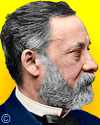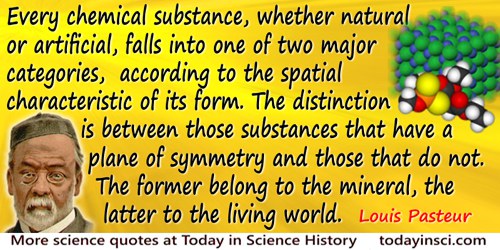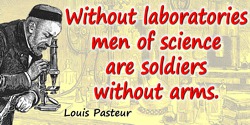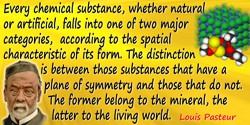 (source)
(source)
|
Louis Pasteur
(27 Dec 1822 - 28 Sep 1895)
French chemist who became a founder of microbiology. He created and tested vaccines for diphtheria, cholera, yellow fever, plague, rabies, anthrax, and tuberculosis.
|
Louis Pasteur Quotes on Life (13 quotes)
>> Click for 67 Science Quotes by Louis Pasteur
>> Click for Louis Pasteur Quotes on | Experiment | Science | Work |
>> Click for 67 Science Quotes by Louis Pasteur
>> Click for Louis Pasteur Quotes on | Experiment | Science | Work |
La fermentation est … la vie sans air, c’est la vie sans oxygène libre
Fermentation is … life without air, it is life without free oxygen.
Fermentation is … life without air, it is life without free oxygen.
— Louis Pasteur
In 'Études sur la Bière', Section 6, 'Théorie Physiologique des Fermentation', Revue Scientifique (26 Aug 1876), 2nd Series, 11, No. 9, 214. This is described as “Pasteur’s famous aphorism, ‘Fermentation is life without oxygen’”, in Burton J. Hendrick, 'Some Modern Ideas on Food', McClure’s Magazine (Apr 1910), 34, No. 6, 667.
After death, life reappears in a different form and with different laws. It is inscribed in the laws of the permanence of life on the surface of the earth and everything that has been a plant and an animal will be destroyed and transformed into a gaseous, volatile and mineral substance.
— Louis Pasteur
Quoted in Patrice Debré, Louis Pasteur, trans. Elborg Forster (1994), 110.
As I show you this liquid, I too could tell you, 'I took my drop of water from the immensity of creation, and I took it filled with that fecund jelly, that is, to use the language of science, full of the elements needed for the development of lower creatures. And then I waited, and I observed, and I asked questions of it, and I asked it to repeat the original act of creation for me; what a sight it would be! But it is silent! It has been silent for several years, ever since I began these experiments. Yes! And it is because I have kept away from it, and am keeping away from it to this moment, the only thing that it has not been given to man to produce, I have kept away from it the germs that are floating in the air, I have kept away from it life, for life is the germ, and the germ is life.'
— Louis Pasteur
Quoted in Patrice Debré, Louis Pasteur, trans. Elborg Forster (1994), 169.

Every chemical substance, whether natural or artificial, falls into one of two major categories, according to the spatial characteristic of its form. The distinction is between those substances that have a plane of symmetry and those that do not. The former belong to the mineral, the latter to the living world.
— Louis Pasteur
Pasteur Vallery-Radot (ed.), Oeuvres de Pasteur (1922-1939), Vol. I, 331. Quoted in Patrice Debré, Louis Pasteur, trans. Elborg Forster (1994), 261.
Every living thing from a living thing.
Omne vivum ex vivo.
Omne vivum ex vivo.
— Louis Pasteur
Associated with Pasteur, perhaps because he popularized this as a motto, but it actually predates his birth. The Latin form is found attributed to William Harvey, for example, in O. v Boltenstern, Die neuere Geschichte der Medicin (1802), 109. Also attributed to Francesco Redi in Andrew Wilson, for example, in 'Science—Culture for the Masses', Science and Poetry: And Other Essays (1888), 31. Attribution to Pasteur can be found, for example, in F.G. Nagasaka, Robert S. Cohen, Japanese Studies in the Philosophy of Science (1998), 181.
If it is a terrifying thought that life is at the mercy of the multiplication of these minute bodies [microbes], it is a consoling hope that Science will not always remain powerless before such enemies...
— Louis Pasteur
Paper read to the French Academy of Sciences (29 Apr 1878), published in Comptes Rendus de l'Academie des Sciences, 86, 1037-43, as translated by H.C.Ernst. Collected in Charles W. Eliot (ed.) The Harvard Classics, Vol. 38; Scientific Papers: Physiology, Medicine, Surgery, Geology (1910), 366.
My present and most fixed opinion regarding the nature of alcoholic fermentation is this: The chemical act of fermentation is essentially a phenomenon correlative with a vital act, beginning and ending with the latter. I believe that there is never any alcoholic fermentation without their being simultaneously the organization, development, multiplication of the globules, or the pursued, continued life of globules which are already formed.
— Louis Pasteur
In 'Memoire sur la fermentation alcoolique', Annales de Chemie et de Physique (1860), 58:3, 359-360, as translated in Joseph S. Fruton, Proteins, Enzymes, Genes: The Interplay of Chemistry and Biology (1999), 137.
The artificial products do not have any molecular dissymmetry; and I could not indicate the existence of a more profound separation between the products born under the influence of life and all the others.
— Louis Pasteur
Quoted in Joseph S. Fruton, Proteins, Enzymes, Genes: The Interplay of Chemistry and Biology (1999), 135.
The universe is an asymmetrical entity. I am inclined to believe that life as it is manifested to us must be a function of the asymmetry of the universe or of the consequence of this fact. The universe is asymmetrical; for if one placed the entire set of bodies that compose the solar system, each moving in its own way, before a mirror, the image shown would not be superimposable on the reality.
— Louis Pasteur
Rene Vallery-Radot, Vie de Pasteur (1900), 79. Quoted in Patrice Debre, Louis Pasteur, trans. Elborg Forster (1994), 78.
The universe is asymmetric and I am persuaded that life, as it is known to us, is a direct result of the asymmetry of the universe or of its indirect consequences. The universe is asymmetric.
Acknowledging the role of molecules that have stereoisomers, some the mirror image of the others, and microorganisms whose chemistry prefers only one of those forms.
Acknowledging the role of molecules that have stereoisomers, some the mirror image of the others, and microorganisms whose chemistry prefers only one of those forms.
— Louis Pasteur
Comptes Rendus de l'Académie des Science (1 Jun 1874). Reprinted in Oeuvres, Vol. 1, 361. In J.B.S. Haldane, Nature, 185, 87. As cited in Alan L. Mackay,The Harvest of a Quiet Eye (1977), 117. Pasteur's application of a microorganism with a chemical behaviour preferring a specific stereoisomer is in Sven Klussmann, The Aptamer Handbook (2006), 420.
To him who devotes his life to science, nothing can give more happiness than increasing the number of discoveries, but his cup of joy is full when the results of his studies immediately find practical applications.
— Louis Pasteur
As quoted in René J. Dubos, Louis Pasteur, Free Lance of Science (1960, 1986), 85.
Two contrary laws seem to be wrestling with each other nowadays: the one, a law of blood and of death, ever imagining new means of destruction and forcing nations to be constantly ready for the battlefield—the other, a law of peace, work and health, ever evolving new means for delivering man from he scourges which beset him. The one seeks violent conquests, the other the relief of humanity. The latter places one human life above any victory: while the former would sacrifice hundreds and thousands of lives to the ambition of one.
— Louis Pasteur
Address at the Inauguration of the Pasteur Institute. In René Vallery-Radot, The Life of Pasteur, translated by Mrs. R. L. Devonshire (1919), 444.
You bring me the deepest joy that can be felt by a man [Pasteur himself] whose invincible belief is that Science and Peace will triumph over Ignorance and War, that nations will unite, not to destroy, but to build, and that the future will belong to those who will have done most for suffering humanity. But whether our efforts are or are not favored by life, let us be able to say, when we come near to the great goal, “I have done what I could.”
— Louis Pasteur
Speech at the Sorbonne, Paris, France (27 Dec 1892) where his 70th birth was recognized. His son presented the speech due to the weakness of Pastuer's voice. In René Vallery-Radot, The Life of Pasteur, R. L. Devonshire (trans.) (1902), Vol. 2, 297.
See also:
- 27 Dec - short biography, births, deaths and events on date of Pasteur's birth.
- Louis Pasteur’s Discovery of Rabies Immunization - from Harper’s Weekly (1885)
- Louis Pasteur - The Modern Era of Immunization from CDC (1985)
- The Private Science of Louis Pasteur, by Gerald L. Geison. - book suggestion.
- Booklist for Louis Pasteur.



 In science it often happens that scientists say, 'You know that's a really good argument; my position is mistaken,' and then they would actually change their minds and you never hear that old view from them again. They really do it. It doesn't happen as often as it should, because scientists are human and change is sometimes painful. But it happens every day. I cannot recall the last time something like that happened in politics or religion.
(1987) --
In science it often happens that scientists say, 'You know that's a really good argument; my position is mistaken,' and then they would actually change their minds and you never hear that old view from them again. They really do it. It doesn't happen as often as it should, because scientists are human and change is sometimes painful. But it happens every day. I cannot recall the last time something like that happened in politics or religion.
(1987) -- 


